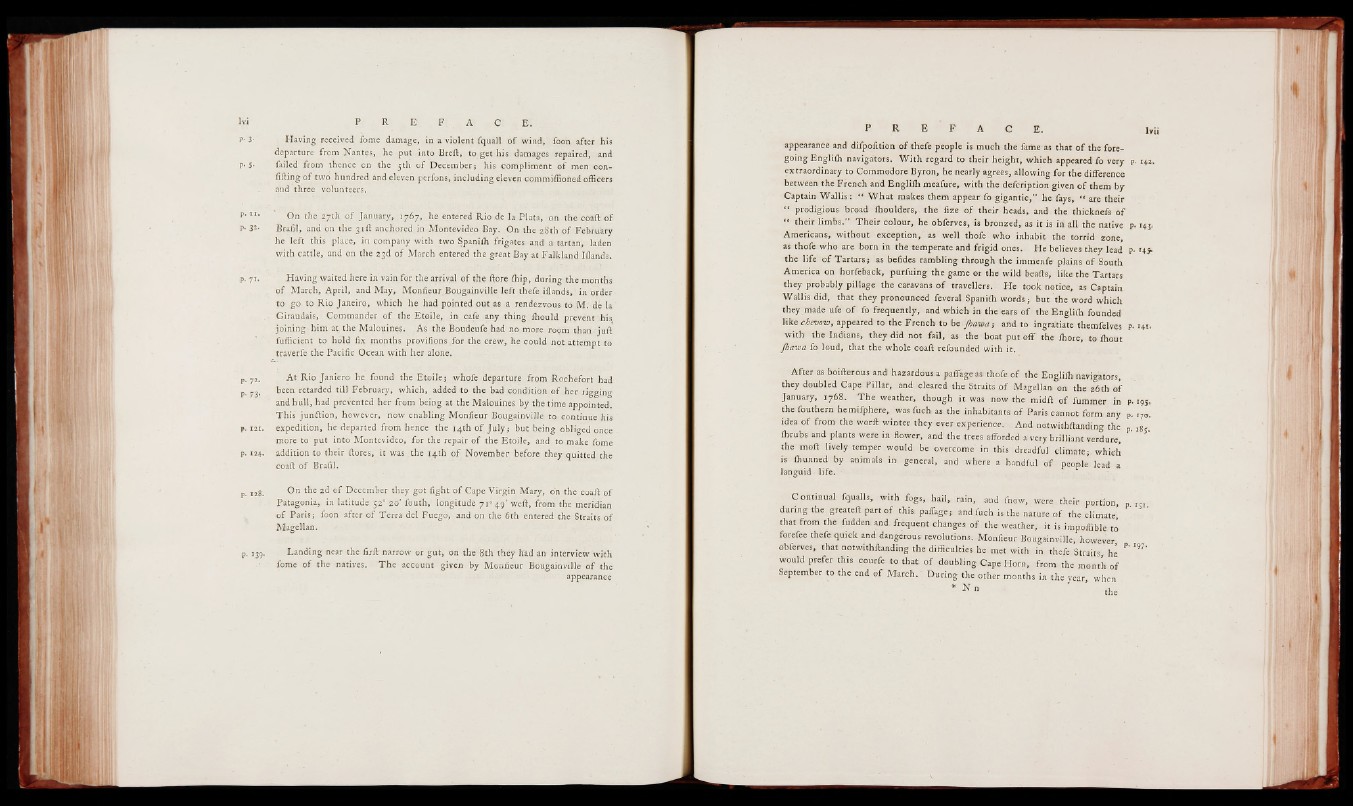
Having received fome damage, in a violent fquall of wind, foon after his
departure from Nantes, he put into Breft, to get his damages repaired, and
failed from thence on the 5th of December j his compliment of men con-
11 fling of two hundred and eleven perfons, including eleven commiffioned officers
and three volunteers,
On the 27th of January, 1767, he entered Rio de la Plata, on the coaft of
Braiil, and on the 31ft anchored in Montevideo Bay. On the 28th of February
he left this place, in company with two Spani'fh frigates and a tartan, laden
with cattle, and on the 23d of March entered the gr-eat Bay at Falkland Iflands.
Having waited here in vain for the arrival of the ftore ihip, during the months
of March, April, and May, Monfieur Bougainville left thefe iflands,' in order
to go to Rio Janeiro, which he had pointed out as a rendezvous to M. de la
Giraudais, Commander of the Etoile, in cafe any thing ihould prevent his
joining him at the Malouines; As the Boudeufe had no more room than.juft
fufficient to hold fix months provifions for the crew, he could not attempt to
traverfe the Pacific Ocean with her alone.
p. 128.
At Rio Janiero he found the Etoile; whofe departure from Rochefort had
been retarded till February, which, added to the bad condition of her rigging
and hull, had prevented her from being at the Malouines by the time appointed.
This junction, however, now enabling Monfieur Bougainville to continue his
expedition, he departed from hence the 14th of July; but being obliged once
more to put into Montevideo, for the repair of the Etoile, and to make fome
addition to their ftores, it was the 14th of November before they quitted the
coaft of Brafil.
On the 2d of December they got fight of Cape Virgin Mary, oh the coaft of
Patagonia, in latitude 520 20’ fouth, longitude 710 49’ weft, from the meridian
of Paris; foon after of Terra del Fuego, and on the 6th entered the Straits of
Magellan.
p. 139. Landing near the firft narrow or gut, on the 8th they had an interview with
fome of the natives. The account given by Monfieur Bougainville of the
appearance
appearance and difpofition of thefe people is much the fame as that of the foregoing
Englifh navigators. With regard to their height, which appeared fo very p. 142.
extraordinary to Commodore Byron, he nearly agrees, allowing for the difference
between the French and Englifh meafure, with the defcription given of them by
Captain Wallis : “ What makes them appear fo gigantic,” he fays, ** are their
“ prodigious broad fhoulders, the fize of their heads, and the thicknefs of
“ their limbs.” Their colour, he obferves, is bronzed, as it is in all the native p. 143*
Americans, without exception, as well thofe who inhabit the torrid zone
as thofe who are born in the temperate and frigid ones. He believes they lead p- 145*
the life of Tartars; as befides rambling through the immenfe plains of South
America on horfeback, purfuing the game or the wild beafts, like the Tartars
they probably pillage the caravans of travellers. He took notice, as Captain
Wallis did, that they pronounced feveral Spanifh words ;, but the word which
they made ufe of fo frequently, and which in the ears of the Englifh founded
like chevowy appeared to the French to be Jhawa ; and to ingratiate themfelves p. 141.
with the Indians, they did not fail, as the boat put off the fhore, to fhout
Jhawa fo loud, that the whole coaft refounded with it.
After as boifterous and hazardous a paffage as thofe of the Englifh navigators,
they doubled Cape Pillar, and cleared the Straits o f Magellan on the 26th of
January, 1768. The weather, though it was now the midft of fummer in p. 195.
the fouthern hemifphere, was fuch as the inhabitants of Paris cannot form, any p. 170.
idea of from the worft winter they ever experience. And notwithftanding the p. ^5.
fhruhs and plants were in flower, and the trees afforded a very brilliant verdure,
the moft lively temper would be overcome in this dreadful climate; which
is fhunned by animals in- general, and where a handful of people lead a
languid life.
Continual fqualls, with fogs, hail, rain, and lo w , were their portion, p ISI
during the greateft part o f this paffagej, and fuch is thè nature of the climate,
that from the fudden and frequent changes of the weather, it is impoffible to
forefee thefe quick and dangerous revolutions. Monfieur Bougainville, however
obferves, that notwithftanding the difficulties he met with in thefe Straits lm
would prefer this courfe to that of doubling Cape Horn, from the month of
September to the end of Marche During the other months in the vear, when
* N n I the